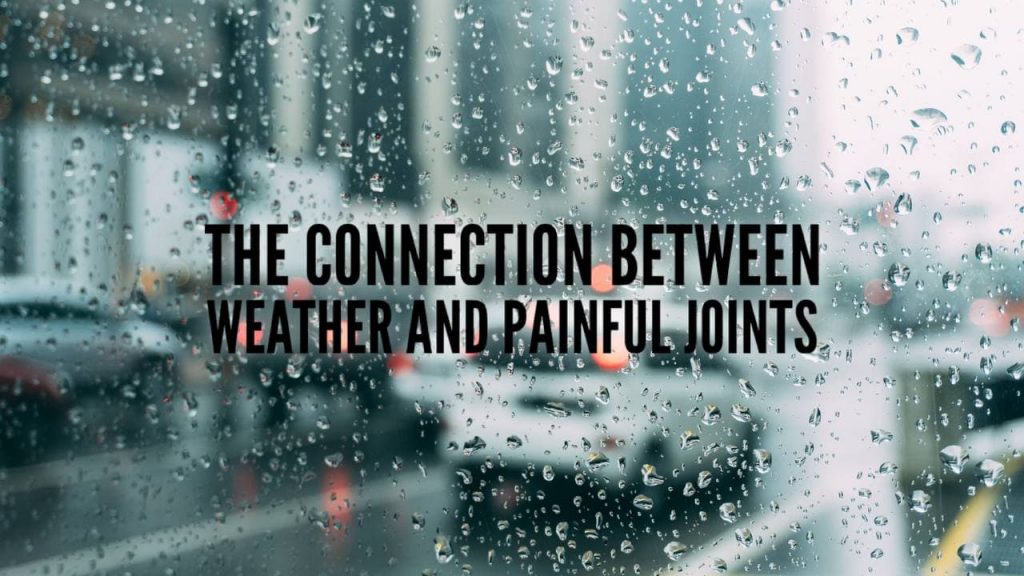With over 1 million orders

DR. ARTHRITIS ASK: WHAT’S THE CONNECTION BETWEEN WEATHER AND ARTHRITIS?
When the weather man predicts bright blue skies with beautiful sunshine but your joints are telling you it’s going to rain–and sure enough it does, is it just luck?
Believe it or not, there may in fact be some evidence behind why arthritis sufferers may be able to predict the weather.
Flare ups or worsening of arthritic symptoms is commonly associated with cold or poor weather conditions. The evidence is largely anecdotal, but further research in this field has found that over 65% of arthritis sufferers say their symptoms changed depending on the weather. In a separate study, research found that every 10 degree drop in temperature translated to higher levels of pain among arthritic patients.
Still, this doesn’t directly explain how someone with arthritis can, with almost impressive accuracy, predict whether it’s going to rain or not. So here’s our take on it: the drop in atmospheric pressure directly affects our joints.
The lower pressure around your joints may cause tissue to swell and if the joint is already inflamed or swollen due to arthritis, the additional swelling may cause tissue to push on muscles and nerves, further worsening pain.
Let’s take a practical approach as to why symptoms may worsen during the winter months. When the weather is bad, we are lazier. When the weather is cold and wet we are less active: you might take the car instead of opting for a ten minute walk, or decide you’d rather stay in bed than get up for that early morning swim you planned. This lack of physical activity may also cause joints to become stiff and ultimately worsen symptoms.
So should you move to Hawaii? Well not for your arthritis. If you have bad knee or shoulder pain, it is likely that the pain will travel with you. In fact, mammals tend to rapidly adapt to their climate and that changes in climate are all relative to where you are currently living.
Arthritis symptoms will vary depending on the weather; but perhaps more research is required to understand the precise mechanisms why.
That said, Dr. Arthritis has put together some tips to help you through the winter months, which we hope will be of benefit:
1. Keep moving
Of course, just like nearly all mammals, humans tend to be less active during the winter. Whether it is to conserve energy, or that when it’s cold and wet, we simply want to stay in bed who knows. However, one thing we do know is that this is not good for your arthritis. Try indoor exercise such as walking (this can even be done inside in a shopping mall!), swimming in heated pools or joining a gym. Sometimes even walking around your home a little more can make a difference!
2. Joint compression aids
We discussed earlier in the article the effect of changes in air pressure and temperature on your symptoms. Joint compression products may be the solution. Not only do they serve to prevent swelling, stiffness and pain in their own right, they can help stabilise the pressure surrounding your joints as well as help maintain the perfect temperature. These, therefore, can really help your arthritic symptoms when the weather isn’t great!
3. Keep warm
Simple but effective. The best way of staying warm is to layer up. Lots of thin layers is better than one thick layer as these help to trap heat. Additionally warm gloves, compression socks, scarf and woolly hat are essential winter items if you have arthritis.
4. Improve your mood
We all have a tendency to feel a little down when the weather is miserable. What many people don’t appreciate is that our mood directly effects our pain threshold. When you’re feeling sad, your arthritic symptoms will worsen. It is important to understand this and get help when needed.
5. Hydrate
Again we don’t really think of staying hydrated as a winter activity but it is just as important to stay hydrated in bad weather as it is your perfect summer’s day. Recent studies have linked your hydration status to how we perceive pain and if we are dehydrated, our pain and symptom tolerance decreases. Easy – stay hydrated, decrease symptoms.
6. Consider supplements
One thing we generally lack during the winter is Vitamin D. Sunshine is an essential ingredient in ensuring we have enough Vitamin D and often we don’t get enough during the winter months. Vitamin D deficiencies can cause joint pain in its own right and may also worsen arthritic symptoms. Consider taking Vitamin D supplement tablets if you feel you are not getting enough.
We hope you find these tips useful and see a positive change to your arthritis symptoms even in the worst of weathers!
